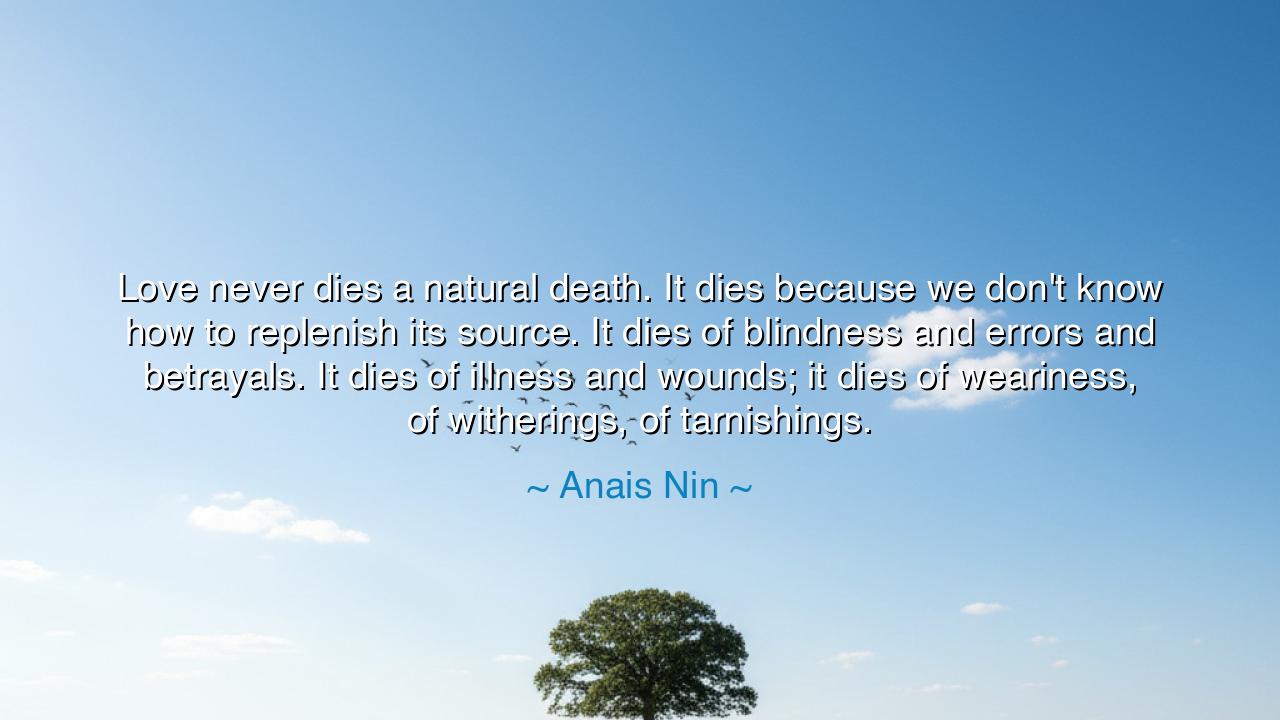
Love never dies a natural death. It dies because we don't know
Love never dies a natural death. It dies because we don't know how to replenish its source. It dies of blindness and errors and betrayals. It dies of illness and wounds; it dies of weariness, of witherings, of tarnishings.






The words of Anaïs Nin, the poet of passion and the chronicler of the human heart, pierce with the gentle sorrow of truth: “Love never dies a natural death. It dies because we don’t know how to replenish its source. It dies of blindness and errors and betrayals. It dies of illness and wounds; it dies of weariness, of witherings, of tarnishings.” In this haunting declaration, she speaks of love not as a passive feeling, but as a living thing—a fragile flame that must be tended, renewed, and understood. Her words remind us that love does not simply fade because time has passed; it perishes because it is neglected, misunderstood, or wounded by the very hands that once cherished it.
Anaïs Nin, born in 1903, lived through an era of emotional and artistic upheaval. A writer and diarist who explored the depths of intimacy, sensuality, and self-awareness, she understood that love was never simple—it was a force both divine and human, capable of great healing and deep harm. This quote arises from her reflections on relationships, which she treated as sacred experiments in understanding the self and the other. To her, the death of love was not fate—it was failure. It was a result of the blindness of the human heart, of the inability to see love as a living presence that requires both reverence and renewal.
When she says, “Love never dies a natural death,” she rejects the easy comfort of blaming time. Time does not kill love—neglect does. The heart grows cold not because the seasons change, but because those who once promised warmth cease to give it. Love dies, she says, of blindness, when lovers refuse to see one another’s souls beyond surface and habit. It dies of errors, when pride triumphs over forgiveness. It dies of betrayals, when the sacred trust between souls is shattered. And like any living creature, love dies of illness and wounds when it is poisoned by resentment, jealousy, or silence. Nin teaches us that love is mortal only when we fail to care for it as we would a tender garden, whose blossoms wither when the hands that tended them grow idle.
Consider the story of Antony and Cleopatra, two lovers whose passion burned brighter than empires but was consumed by pride, war, and misunderstanding. Their love did not die a natural death—it was destroyed by their own errors, their inability to trust, their enslavement to ambition and fear. The tragedy of their end mirrors the truth of Nin’s words: love can survive the world, but not the wounds inflicted from within. It is never time that ends love, but human frailty—the blindness that forgets what once made the heart tremble with joy.
Her mention of weariness and tarnishings speaks to a quieter tragedy—the slow fading of love when it is taken for granted. Many loves do not end in storms, but in silence. The partners who once gazed into each other’s souls begin to look past one another; small neglects accumulate like dust upon something once radiant. Love, unrenewed, becomes weary. It loses its luster not because it was false, but because it was not fed. Nin urges us to remember that love’s source must be replenished—through kindness, understanding, patience, and the deliberate act of seeing one another anew, again and again.
In her wisdom, Anaïs Nin reminds us that love is both miracle and responsibility. To love deeply is to commit to the lifelong art of nurturing. It is to know that love, like a flame, can light the world, but only if it is guarded against the winds of neglect and the rains of indifference. The great error of humankind is to assume that love, once found, will endure without tending. But love, like life itself, must be cultivated daily. Without humility, compassion, and care, it withers. With attention and devotion, it becomes immortal.
Lesson and Practice:
Guard your love as you would a sacred fire. Feed it with gratitude, honesty, and time. When weariness comes, remember why it began. Heal the small wounds before they deepen; speak the truth before silence builds its walls. Do not let blindness or pride turn your heart away from what is precious. For love, as Anaïs Nin teaches, does not die on its own—it is slain by forgetfulness. Let this be your vow: to keep love alive not by chance, but by choice; to replenish its source as one tends a living soul. For the one who learns to sustain love learns also the secret of eternity, where nothing precious is ever truly lost.






AAdministratorAdministrator
Welcome, honored guests. Please leave a comment, we will respond soon